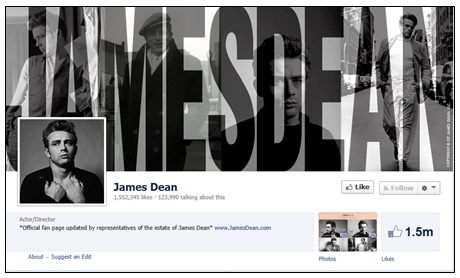 Social media has become a powerful marketing tool, allowing celebrities to develop their brands and images with the help of Facebook updates or Tweets that can reach millions of fans at the same time. Given the importance of social media as a brand-building medium, how should the law treat “fan accounts,” which are created by fans using a celebrity’s name? What protection does the law provide to celebrities trying to control usage of their personae and brands on social media platforms?
Social media has become a powerful marketing tool, allowing celebrities to develop their brands and images with the help of Facebook updates or Tweets that can reach millions of fans at the same time. Given the importance of social media as a brand-building medium, how should the law treat “fan accounts,” which are created by fans using a celebrity’s name? What protection does the law provide to celebrities trying to control usage of their personae and brands on social media platforms?
These questions are at the center of a complaint recently brought against Twitter by CMG Worldwide (“CMG”) over a Twitter fan account. CMG holds the exclusive license for intellectual property pertaining to the deceased actor, James Dean, and manages the intellectual property rights of several other deceased celebrities, including Marilyn Monroe and Babe Ruth. CMG alleges that, since September 2012, Twitter has allowed a user to maintain an account using the handle @JamesDean, which allegedly included unspecified “objectionable content.”
 CMG complained about the fan account to Twitter, which in fact does have “Parody, commentary, and fan account policy” in place. The policy warns account holders against misleading third parties about the account holder’s true identity, and requires fan account operators to convey through the account name and Bio section that the account is not an official celebrity account. Twitter reviewed the @JamesDean account and informed CMG that the account was not in violation of its policy because “it was not being used in a way that is misleading or confusing with regard to its brand, location or business affiliation.”
CMG complained about the fan account to Twitter, which in fact does have “Parody, commentary, and fan account policy” in place. The policy warns account holders against misleading third parties about the account holder’s true identity, and requires fan account operators to convey through the account name and Bio section that the account is not an official celebrity account. Twitter reviewed the @JamesDean account and informed CMG that the account was not in violation of its policy because “it was not being used in a way that is misleading or confusing with regard to its brand, location or business affiliation.”
CMG, unsatisfied with this response, asserted nine causes of action against Twitter and the Twitter user that operates the @JamesDean account, including trademark infringement and false endorsement under the Lanham Act, right of publicity and unfair competition. The case was originally brought in Indiana state court, but Twitter removed the case to federal court, and now the matter is pending before the United States District Court for the Southern District of Indiana.
A case alleging infringement by a “fan account” will differ from most trademark infringement actions in at least one significant way: Usually, trademark infringement claims involve two competitors sparring over one party’s allegedly unlawful use of the other party’s trademark. Creators of fan accounts, however, are not aiming to compete with the celebrity. On the contrary, most fan accounts are set up to venerate a celebrity’s work. The last thing a typical fan account creator wants is to cause harm to a celebrity’s persona or brand.
The fact that a fan account creator usually has no commercial motive could make it difficult for a plaintiff to succeed on a trademark infringement claim. One of the elements a plaintiff is required to show in a trademark infringement action is that the defendant used the mark “in connection with the sale, offering for sale, distribution, or advertising” of goods or services. Courts dealing with online trademark infringement in the past have held that, in order for such a claim to succeed, the website in question must either itself advertise or sell goods and services, or must connect customers to some other commercial operation, for example, by providing links to another website which is operated for commercial reasons.
Here, the Tweets in the @JamesDean Twitter feed reveal no obvious commercial motive, but rather suggest that the operator of the account was mainly using the Twitter handle to commemorate James Dean’s work and acting style. The feed is filled with laudatory quotes about the actor and his legacy, and little else. Whether this is sufficient to meet the standard required to succeed on a trademark infringement claim, and overcome a nominative fair use defense and other defenses, remains to be seen. From a practical standpoint, a ruling that the @JamesDean account infringes CMG’s trademark might open the floodgates to more aggressive takedown strategies and similar lawsuits brought by celebrities and their representatives against social networking services, some of which are currently hosting hundreds of (presumably unauthorized) “fan accounts.”
Twitter’s response to the complaint is due in May 2014.